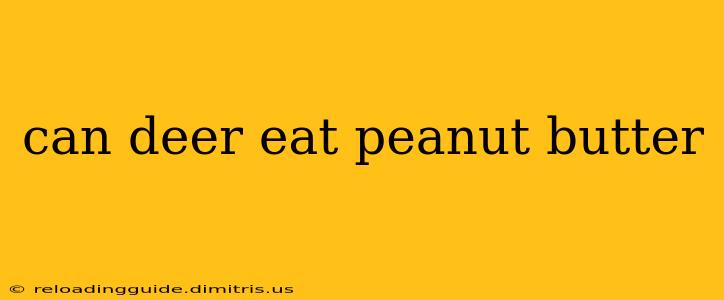The question of whether deer can eat peanut butter is a common one among nature enthusiasts and those who encounter deer in their yards. While the tempting image of a deer happily lapping up peanut butter might seem harmless, the reality is more nuanced. The short answer is: yes, deer can eat peanut butter, but they shouldn't. Let's delve into the reasons why.
The Nutritional Value (or Lack Thereof) of Peanut Butter for Deer
Peanut butter, while a source of protein and fat for humans, isn't a natural part of a deer's diet. Their digestive systems are designed for foraging on grasses, leaves, twigs, and fruits – foods high in fiber and low in fat and processed sugars. Peanut butter, on the other hand, is high in fat, salt, and often added sugars, none of which are beneficial to a deer's health.
Potential Negative Impacts:
- Obesity and Metabolic Disorders: The high fat content in peanut butter can lead to obesity in deer, increasing their susceptibility to various health problems like metabolic disorders and decreased mobility. An overweight deer is more vulnerable to predators and less able to navigate its environment effectively.
- Digestive Issues: The lack of fiber in peanut butter can disrupt a deer's delicate digestive system. This can lead to constipation, diarrhea, or other uncomfortable and potentially dangerous gastrointestinal problems.
- Nutritional Imbalance: Feeding deer peanut butter disrupts their natural diet, depriving them of essential nutrients they would obtain from their usual food sources. This imbalance can weaken their immune system, making them more vulnerable to disease.
- Dependency and Unnatural Behaviors: Providing supplemental food like peanut butter can create dependency, leading deer to rely on humans for sustenance rather than foraging for themselves. This can result in unnatural behaviors and increased human-wildlife conflict.
Alternatives to Peanut Butter for Wildlife
If you're concerned about providing supplementary food for deer, especially during harsh winters, it's crucial to choose appropriate options. Consult with wildlife experts or your local wildlife rehabilitation center for guidance on appropriate and safe food sources. These professionals can provide valuable insights tailored to your specific region and the needs of the local deer population.
Remember, the best way to help deer thrive is to preserve and protect their natural habitat, ensuring an abundant supply of their natural food sources.
Conclusion: Leave the Peanut Butter for Humans
While deer might show curiosity towards peanut butter, it's crucial to resist the urge to feed it to them. The potential health risks significantly outweigh any perceived benefits. Instead, focus on preserving their natural environment and respecting their wild nature. This approach ensures their long-term well-being and minimizes the potential for negative consequences from human intervention. Remember, admiring deer from a distance is the best way to ensure their health and safety.

